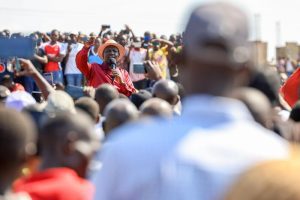President William Ruto launched a sharp rebuke against his former deputy, Rigathi Gachagua, during a public address at Mandera Teachers Training College on Tuesday, accusing him of sabotaging government initiatives and fueling regional divisions. The President’s remarks came in response to Gachagua’s recent criticism of the administration’s tax policies, which he claims disproportionately burden salaried workers.
Ruto dismissed Gachagua as a “poor planner” devoid of “moral authority or vision,” asserting that his former ally’s attempts to politicize payslip deductions and stoke ethnic tensions would fail. “Those trying to divide us into Mt. Kenya versus Rift Valley, or those with payslips versus those without, are leaderless and agenda-less. They will not succeed,” Ruto declared, vowing to counter what he termed “retrogressive politics.”

Policy Shift: Ruto Pledges to End Discriminatory ID Vetting
In a significant policy announcement, the President pledged to abolish the controversial vetting process for Kenyans in northern regions seeking national identification cards (IDs). The practice, long criticized as discriminatory, had been a point of contention for communities alleging marginalization. “This vetting system treated our brothers and sisters in the north as outsiders. It ends now,” Ruto stated, framing the move as part of his administration’s broader inclusivity agenda.
Gachagua Fires Back: Tax Reforms and Youth Dialogue Promised
Gachagua, speaking earlier from his Wamunyoro residence in Kiambu County via a live TikTok session, doubled down on his critique of the government’s fiscal approach. He accused the administration of imposing “excessive taxes” that strain middle- and lower-income earners, promising to mobilize public support to reverse the policies. “We must restore sanity to payslips. The current deductions are unsustainable for working Kenyans,” he argued.
The former Deputy President also revealed plans to engage youth-led online communities to discuss economic reforms, signaling a strategic pivot toward Kenya’s digitally active demographic. “Our young people deserve a voice in shaping solutions,” he added.
Political Tensions Escalate Amid Broader Economic Debate
The exchange marks a dramatic escalation in the rift between the once-allied leaders, with Ruto framing Gachagua’s criticisms as a threat to national cohesion. Analysts suggest the clash reflects deeper tensions within Kenya’s political landscape, where economic policies and ethnic allegiances remain potent flashpoints.
As the government defends its tax reforms as necessary for economic growth, opposition figures like Gachagua are capitalizing on widespread public frustration over rising living costs. With both leaders rallying distinct support bases, the confrontation sets the stage for a contentious battle over Kenya’s fiscal and social direction.
 Kenya Breaking News Breaking News Now
Kenya Breaking News Breaking News Now
